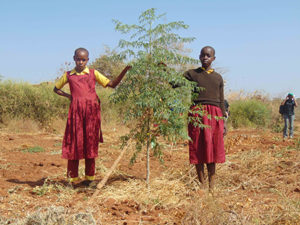
KenGen is committed to environmental conservation and sustainably safeguarding the environment it shares with other communities at its areas of operations—for today and generations to come. Through the Foundation, the Company has invested in long-term programs dedicated to sustainable environmental conservation and promoting a tree planting culture within the organization.
The Schools' Green Initiative Challenge
The GIC is structured as a competition to participating schools, mainly due to the dry weather conditions in their locations, with prizes awarded based on the highest survival rate of seedlings, use of innovation, and community inclusion.
Through the setting up of woodlots in participating schools, the project acts as a change agent to establish a tree-planting culture for multiple benefits in dry-land areas.
Even higher benefits are the project’s contribution to the reduction of greenhouse gases through carbon sequestration, and the control soil erosion by increasing topsoil infiltration and reducing runoff.
Project objectives
- Boost awareness and participation of school children in climate change mitigation through environmental conservation via sustainable management and harvesting of trees.
- Provide schools with renewable source of wood fuel thereby reducing pressure on surrounding forest resources.
- Diversification of income through sale of timber and non-timber products as well as fruits.
- Contribute to reduction of green-house gases through carbon sequestration by growing woodlots.
- Control soil erosion by increasing topsoil infiltration and reducing runoff.
- Through this project, community members are encouraged to establish ‘household woodlots’ and trained on sustainable rain water harvesting and storage techniques.
 GIC Phase I (2013 to 2015) – Registered 81 schools in Embu and Machakos Counties. A total of 24,584 seedlings were issued out and the average survival is 55.5% which translated to 13,644 trees. Approximately >40 acres were re-afforested at end of Phase I.
GIC Phase I (2013 to 2015) – Registered 81 schools in Embu and Machakos Counties. A total of 24,584 seedlings were issued out and the average survival is 55.5% which translated to 13,644 trees. Approximately >40 acres were re-afforested at end of Phase I.
Click here to read and download the Schools’ Green Initiative Challenge Phase I Report
 GIC Phase II (2015-2017) – Registered 120 schools in Kitui, Embu and Machakos Counties – 40 schools per county. A total of 48,812 seedlings were supplied. The current average survival rate is 41% and this translates to 20,013 trees. Approximately >60 acres have been re-afforested.
GIC Phase II (2015-2017) – Registered 120 schools in Kitui, Embu and Machakos Counties – 40 schools per county. A total of 48,812 seedlings were supplied. The current average survival rate is 41% and this translates to 20,013 trees. Approximately >60 acres have been re-afforested.
Click here to download the Technical Manual for small forests and woodlots
Phase II introduced the concept of the ‘Green’ teacher, an environment patron who helps in managing the tree planting activities; Monitoring and Evaluation Officers; and annual capacity building sessions facilitated by the project partners.
Apart from Mukau (M. Volkensii) and Muveshi (S. Siamea), GIC Phase II also includes the planting of paw-paw and yellow passion fruit trees as value addition to the project.
Education scholarships for selected students in the participating schools are also included as part of the winning prize.
 GIC Phase III (2017-2019) -Registered 99 schools in Kitui, Embu and Machakos Counties – 33 schools per county. Phase three includes the participating schools’ head teachers in the capacity building sessions for project ownership and inclusive woodlots management across all levels of administration.A total of 45,560 seedlings were issued out. The current survival rate is 53.24%; 24,257seedlings surviving. Approximately >55 acres re-afforested.
GIC Phase III (2017-2019) -Registered 99 schools in Kitui, Embu and Machakos Counties – 33 schools per county. Phase three includes the participating schools’ head teachers in the capacity building sessions for project ownership and inclusive woodlots management across all levels of administration.A total of 45,560 seedlings were issued out. The current survival rate is 53.24%; 24,257seedlings surviving. Approximately >55 acres re-afforested.
Currently ongoing, GIC Phase V (2019-2021)-Registered 100 schools in Kitui, Machakos & Embu counties- i.e 33 Machakos, 33 Embu & 34 Kitui. A total of 30,200 seedlings distributed.
GIC Turkwell

The Foundation launched a pilot project with Tullow Oil in 2020, involving 14 schools from West Pokot and 14 schools from Turkana County, with 56 teachers and head teachers trained.
Achievements so far...
- Creating environmental awareness; change of attitude towards afforestation/re-afforestation in the ASALs.
- Contribution to the national tree cover; target is 10% tree cover.
- Creation of micro-climate in participating schools.
- Increasing of carbon sink thus offsetting impacts of climate change.
- Ease pressure on existing vegetation; providing a renewable source of fuel wood.
- Catchment conservation.
- Stakeholders satisfaction.

